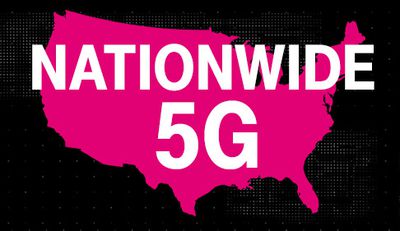T-Mobile Teases Plans to Launch Nationwide 5G Network in U.S. Within Three Years
T-Mobile today said it plans to roll out a 5G network in the United States starting in 2019, with a target of 2020 for full nationwide coverage.

The third-largest U.S. carrier said it will use part of its newly acquired 600 MHz low-band spectrum to deliver 5G coverage from coast to coast.
“The 600 MHz spectrum will allow 5G to be deployed nationwide, bringing the ultimate experiences to T-Mobile’s enterprise customers and consumers throughout the United States,” said Borje Ekholm, President and CEO, Ericsson. “We will support T-Mobile US with 5G radio development for this spectrum. Commercial availability of the product will be aligned with 3GPP standardization and ecosystem support.”
5G networks will pave the way for faster data speeds and lower latency on smartphones and other cellular-enabled devices. Last year, AT&T said it reached speeds above 10 gigabits per second in early 5G lab trials, and it has even promised speeds up to 100 times faster than 4G LTE.
5G isn't expected to become a reality until at least next year, as 3GPP is still working to establish the first set of 5G standards by 2018.
T-Mobile will help drive 3GPP certification for 5G in 600 MHz. As 5G standards are defined, chipsets are delivered, and equipment comes to market, T-Mobile will quickly deploy 5G nationwide in a large swath of unused spectrum.
T-Mobile expects the first smartphones compatible with the 600 MHz spectrum to be released later this year.
In February, Verizon said it will begin offering gigabit broadband internet over a wireless 5G connection to pilot customers in 11 select U.S. markets during the first half of 2017. AT&T is also rolling out "5G Evolution" speeds in over 20 major metro areas, but as widely reported, it's not really 5G.
Popular Stories
Apple's next-generation iPhone 17 Pro and iPhone 17 Pro Max are just over two months away, and there are plenty of rumors about the devices.
Below, we recap key changes rumored for the iPhone 17 Pro models.
Latest Rumors
These rumors surfaced in June and July:Apple logo repositioned: Apple's logo may have a lower position on the back of the iPhone 17 Pro models, compared to previous...
Apple should unveil the iPhone 17 series in September, and there might be one bigger difference between the Pro and Pro Max models this year.
As always, the Pro Max model will be larger than the Pro model:iPhone 17 Pro: 6.3-inch display
iPhone 17 Pro Max: 6.9-inch displayGiven the Pro Max is physically larger than the Pro, it has more internal space, allowing for a larger battery and...
In 2020, Apple added a digital car key feature to its Wallet app, allowing users to lock, unlock, and start a compatible vehicle with an iPhone or Apple Watch. The feature is currently offered by select automakers, including Audi, BMW, Hyundai, Kia, Genesis, Mercedes-Benz, Volvo, and a handful of others, and it is set to expand further.
Apple has a web page with a list of vehicle models that ...
The calendar has turned to July, meaning that 2025 is now more than half over. And while the summer months are often quiet for Apple, the company still has more than a dozen products coming later this year, according to rumors.
Below, we have outlined at least 15 new Apple products that are expected to launch later this year, along with key rumored features for each.
iPhone 17 Series
iPho...
Apple is continuing to refine and update iOS 26, and beta three features smaller changes than we saw in beta 2, plus further tweaks to the Liquid Glass design. Apple is gearing up for the next phase of beta testing, and the company has promised that a public beta is set to come out in July.
Transparency
In some apps like Apple Music, Podcasts, and the App Store, Apple has toned down the...
Since the iPhone X in 2017, all of Apple's highest-end iPhone models have featured either stainless steel or titanium frames, but it has now been rumored that this design decision will be coming to an end with the iPhone 17 Pro models later this year.
In a post on Chinese social media platform Weibo today, the account Instant Digital said that the iPhone 17 Pro models will have an aluminum...
New renders today provide the best look yet relocated Apple logo and redesigned MagSafe magnet array of the iPhone 17 Pro and iPhone 17 Pro Max.
Image via Majin Bu.
Several of the design changes coming to the iPhone 17 Pro model have been rumored for some time, such as the elongated camera bump that spans the full width of the device, with the LiDAR Scanner and flash moving to the right side.
...
Amazon is soon to be back with its annual summertime Prime Day event, lasting for four days from July 8-11, the longest Prime Day yet. As it does every year, Prime Day offers shoppers a huge selection of deals across Amazon's storefront, and there are already many deals you can get on sale ahead of the event.
Note: MacRumors is an affiliate partner with Amazon. When you click a link and make a ...
Apple's position as the dominant force in the global true wireless stereo (TWS) earbud market is expected to continue through 2025, according to Counterpoint Research.
The forecast outlines a 3% year-over-year increase in global TWS unit shipments for 2025, signaling a transition from rapid growth to a more mature phase for the category. While Apple is set to remain the leading brand by...






















